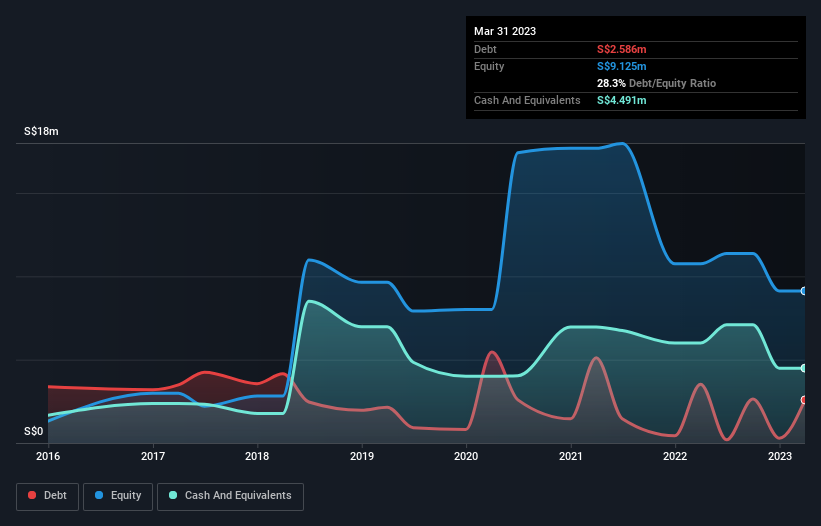
Legendary fund manager Li Lu (who Charlie Munger backed) once said, 'The biggest investment risk is not the volatility of prices, but whether you will suffer a permanent loss of capital.' When we think about how risky a company is, we always like to look at its use of debt, since debt overload can lead to ruin. We can see that IAG Holdings Limited (HKG:8513) does use debt in its business. But is this debt a concern to shareholders?
When Is Debt Dangerous?
Debt and other liabilities become risky for a business when it cannot easily fulfill those obligations, either with free cash flow or by raising capital at an attractive price. Part and parcel of capitalism is the process of 'creative destruction' where failed businesses are mercilessly liquidated by their bankers. However, a more usual (but still expensive) situation is where a company must dilute shareholders at a cheap share price simply to get debt under control. Of course, plenty of companies use debt to fund growth, without any negative consequences. The first thing to do when considering how much debt a business uses is to look at its cash and debt together.
Check out our latest analysis for IAG Holdings
What Is IAG Holdings's Net Debt?
As you can see below, IAG Holdings had S$2.59m of debt at December 2022, down from S$3.52m a year prior. However, it does have S$4.49m in cash offsetting this, leading to net cash of S$1.91m.

A Look At IAG Holdings' Liabilities
According to the last reported balance sheet, IAG Holdings had liabilities of S$4.87m due within 12 months, and liabilities of S$2.32m due beyond 12 months. On the other hand, it had cash of S$4.49m and S$3.91m worth of receivables due within a year. So it can boast S$1.20m more liquid assets than total liabilities.
This excess liquidity suggests that IAG Holdings is taking a careful approach to debt. Because it has plenty of assets, it is unlikely to have trouble with its lenders. Succinctly put, IAG Holdings boasts net cash, so it's fair to say it does not have a heavy debt load! The balance sheet is clearly the area to focus on when you are analysing debt. But it is IAG Holdings's earnings that will influence how the balance sheet holds up in the future. So if you're keen to discover more about its earnings, it might be worth checking out this graph of its long term earnings trend.
Over 12 months, IAG Holdings made a loss at the EBIT level, and saw its revenue drop to S$14m, which is a fall of 27%. That makes us nervous, to say the least.
So How Risky Is IAG Holdings?
By their very nature companies that are losing money are more risky than those with a long history of profitability. And the fact is that over the last twelve months IAG Holdings lost money at the earnings before interest and tax (EBIT) line. Indeed, in that time it burnt through S$1.4m of cash and made a loss of S$3.5m. While this does make the company a bit risky, it's important to remember it has net cash of S$1.91m. That kitty means the company can keep spending for growth for at least two years, at current rates. Overall, its balance sheet doesn't seem overly risky, at the moment, but we're always cautious until we see the positive free cash flow. When analysing debt levels, the balance sheet is the obvious place to start. However, not all investment risk resides within the balance sheet - far from it. For example, we've discovered 4 warning signs for IAG Holdings (3 are significant!) that you should be aware of before investing here.
If you're interested in investing in businesses that can grow profits without the burden of debt, then check out this free list of growing businesses that have net cash on the balance sheet.
New: Manage All Your Stock Portfolios in One Place
We've created the ultimate portfolio companion for stock investors, and it's free.
• Connect an unlimited number of Portfolios and see your total in one currency
• Be alerted to new Warning Signs or Risks via email or mobile
• Track the Fair Value of your stocks
Have feedback on this article? Concerned about the content? Get in touch with us directly. Alternatively, email editorial-team (at) simplywallst.com.
This article by Simply Wall St is general in nature. We provide commentary based on historical data and analyst forecasts only using an unbiased methodology and our articles are not intended to be financial advice. It does not constitute a recommendation to buy or sell any stock, and does not take account of your objectives, or your financial situation. We aim to bring you long-term focused analysis driven by fundamental data. Note that our analysis may not factor in the latest price-sensitive company announcements or qualitative material. Simply Wall St has no position in any stocks mentioned.
About SEHK:8513
MaxWin International Holdings
An investment holding company, manufactures and sells injection molded plastic parts for disposable medical devices in Asia and Europe.
Mediocre balance sheet low.


